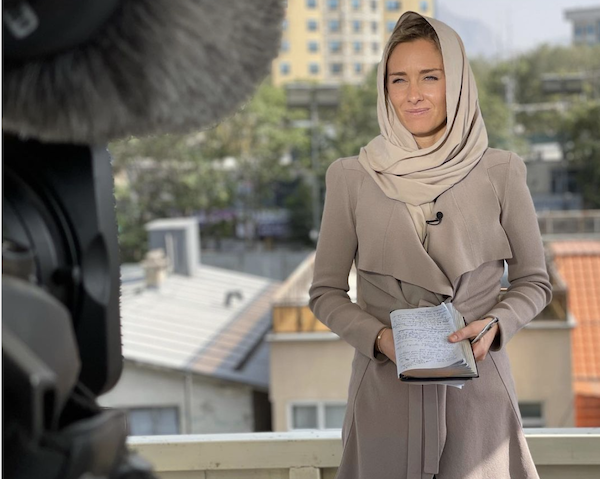One has to be in a truly "messed up" situation to seek an offer of safe haven from the Taliban, a New Zealand journalist pointed out

A New Zealand reporter, who ended up pregnant and unmarried while working in Qatar for broadcaster Al Jazeera, has revealed that she had to turn to the Taliban for help after her own country said she couldnít return due to Covid-19 curbs.
Charlotte Bellis had previously become famous when she attended the Talibanís first press conference after the radical group took power in Afghanistan last August and asked its leaders: "What will you do to protect the rights of women and girls?"
Now, sheís making headlines again after finding herself in an unexpected conundrum, which the reporter detailed in a bombshell opinion piece for the New Zealand Herald on Friday.
In September, when Bellis returned from Afghanistan to Qatarís capital Doha, where Al Jazeera is based, she found out that she was pregnant from her partner Jim Huylebroek, a photographer who contributes to the New York Times and who had also been in Kabul.
It was a huge surprise as doctors had always been saying that she was incapable of having kids, but it also meant that the reporter couldnít stay in Qatar anymore, as being pregnant and unmarried was illegal under that Muslim countryís laws.
Bellis resigned from Al Jazeera, hoping to give birth sometime in May in New Zealand, which shut itself from the outside world during the pandemic but planned to reopen its borders for residents in February.
The duo went to Belgium -Huylebroekís home country- to wait until regular flights to New Zealand became available. The reporter knew her nationality meant she couldnít stay in the EU for too long, so sheíd also been trying to win a spot in a Managed Isolation and Quarantine (MIQ) facility in New Zealand, but with no luck.
And when the reopening of the borders was delayed by the authorities in Wellington due to the emergence of the Omicron variant, Bellis was left with just one destination she could travel to - Kabul. Both she and Huylebroek and still had visas that allowed them to live in Afghanistan.
The reporter said she organized a meeting with senior Taliban contacts, asking them if thereíll be "a problem" if she comes to the Afghan capital with her partner, considering the fact that sheís pregnant and that they werenít a married couple.
"No, weíre happy for you, you can come and you wonít have a problem," a Taliban official responded, according to Bellis. "Just tell people youíre married and if it escalates, call us. Donít worry. Everything will be fine."
"When the Taliban offers you - a pregnant, unmarried woman - safe haven, you know your situation is messed up," she wrote.
The reporter is currently in Kabul, but she doesnít want to actually give birth in Afghanistan due to the turbulent situation and poor state of healthcare in the country.
With the UN expecting an extra 50,000 Afghan women to die in childbirth by 2025, "getting pregnant can be a death sentence" there, she pointed out.
But those arguments didnít seem too convincing to the authorities in New Zealand, who rejected Bellisí emergency MIQ spot application on Monday. Among other things, the pregnant woman was told that she "did not provide any evidence" of having a scheduled "time-critical" medical treatment in New Zealand and that she couldnít access the same treatment in her "current location."
The reporter confessed that she was "in shock" after getting such a response. She started contacting lawyers and some other important people in New Zealand to make it clear that she was going to fight back against the ruling - by appealing and taking it to the media.
But, on Wednesday, the status of her application on the MIQ website switched from "deactivated" to "in progress." The next day, her partner received an email, saying that he could now also apply for an emergency MIQ spot.
According to Bellis, the turnaround occurred after New Zealandís Covid-19 Response Minister Chris Hipkins was informed of their case. And she wasnít happy to be "getting preferential treatment" from the government, which only wants to avoid "an incoming political headache."
"They rejected us, like they have so many thousands of other desperate New Zealanders, and seemingly because of who we are, and the resources we have," she argued.
The reporter said she decided to share her troubles because "the decision of who should get an emergency MIQ spot is not made on a level playing field, lacks ethical reasoning and pits our most vulnerable against each other."
She called for the system to be changed, adding that it was time for the authorities in New Zealand, not the Taliban, to answer what would they do to protect the rights of women.
Hipkins later confirmed to The NZ Herald that he was told about the reporterís situation by "a senior National Party MP"and ordered to check "whether the proper process was followed" regarding her emergency MIQ application.
LINK: https://www.ansarpress.com/english/26538
TAGS:






























 Farkhunda Buried, Ghani Appoints Fact-Finding Team
Farkhunda Buried, Ghani Appoints Fact-Finding Team




